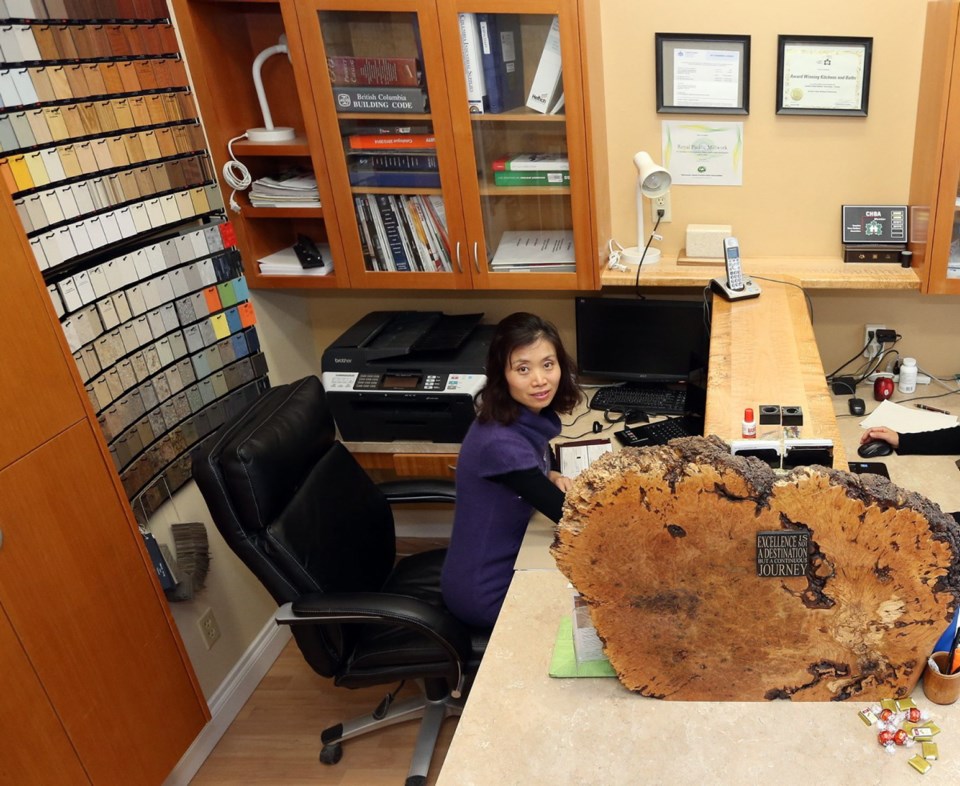The warm scent of wood and the sound of buzzing saws once again fill the former Dan Johnson Woodworking studio.
The small Sidney workshop nearly went under when its owner had a stroke and the staff were laid off in spring 2013. Six months later, it was back up and running after Chinese businesswoman Ping Li bought the business, rechristening it Royal Pacific Millworks.
Li wanted to come to Canada to join her son, an international student since high school. With little facility in English but some experience in her family cable business, she applied for the Provincial Nominee Program. Through the program, provinces are able to offer entrepreneurs a fast-track to permanent residency.
“It’s very beautiful here,” Li said through a translator, noting the clean air and neighbourhoods.
By late November, Li had new business cards and a website with the guidance of Sasha Zhang — a Victoria businesswoman who helped her set up the business. Within a month, the studio had several contracts. It expanded to commercial work and rehired the master craftsmen who built parts of the Bengal Lounge bar and several shops in the Fairmont Empress hotel.
The Provincial Nominee Program requires that owners commit to keeping a business going for at least two years. What happens after that is up to the owner.
That’s a concern for some. The B.C. Ministry of Jobs, Tourism and Skills Training, which oversees the program, says it monitors participants, conducting interviews and site visits, and looking for proof applicants have long-term plans to run their businesses. But some critics say the program is under-regulated.
The local business community is of two minds about the program, said Michael Naprawa, president of Sunbelt Business brokers in Nanaimo, which works with people in the program.
On one hand, the program brings jobs and diversity to the Island, he said. Since 2009, the program has helped establish 50 businesses — restaurants, motels and publishing companies among them — on the Island, including 32 in Victoria, representing an investment of at least $10 million. But Naprawa is concerned some buyers don’t plan to invest in the community or their business beyond the minimum requirements.
“Much of Canada’s population is made up of immigrants. No one can deny the benefit — the country has prospered by this fact,” Naprawa said. “Most people come to Canada because they do not like the political situation of their country and want to provide a better future for their children.”
Those are the investors he likes to work with. The ones he doesn’t are “the extreme wealthy that are trying to buy their way to Canada because they can,” he said. He chooses not to work with anyone who tries to shortcut the qualifications or doesn’t seem interested in contributing to the community.
This has been a concern for the government, too. In 2012, B.C. suspended its fast-track option for the program after reported abuses and low success rates. For a $125,000, bond investors could access a speedy visa. The program saw a spike after the federal government halted its investor programs. The B.C. government also found the majority of investors who promised to run business were not doing so.
But most participants in the non-fast track program appear to stay involved with their businesses. In 2011, an independent survey of B.C.’s program showed 68 per cent of the entrepreneurs from 2005 to 2010 were still involved in their businesses. Thirteen per cent of those no longer involved had shut down and 38 per cent had become self-employed.
Naprawa said his clients come from Asia, Iran and Europe. Recently, most have been from China. He has helped sell at least nine Victoria businesses to foreign investors involved in the program in the past year, including Mister Sweeper on Ravine Way and PY Marine in Port Alberni. He brokered the sale of Mercias Vitamins and Nutritional Supplements in Duncan to a pharmacist from China. “Last year, Nanaimo was big. Now, it’s Victoria,” he said.
Investors wanting to qualify for the program often look to the Island because they don’t need as much capital to qualify as they would in Vancouver, where the required minimum investment is $400,000.
- - -
How the program works
B.C.’s Provincial Nominee Program, which is administered under the Ministry of Jobs, Tourism and Skills Training, has two streams: skills immigration and business immigration.
Business immigrants on Vancouver Island must have a net worth of at least $400,000 and a minimum of $200,000 to start or purchase and expand a business. In return, they are given a two-year work permit. If they meet the program requirements — including creation of at least one full-time job for a Canadian citizen or permanent resident — they are nominated by the B.C. program for permanent residence in Canada.
The requirements in Vancouver are double the monetary investment as part of an effort to attract immigrants to rural areas.
The skills program is intended to help B.C. employers find the workers they need. Employers offer prospective workers a full-time job and sponsor them for permanent residence.



